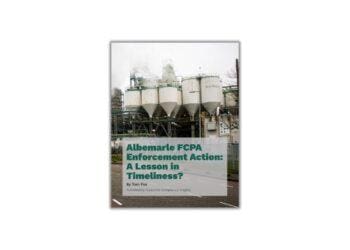Federal contracting can be lucrative and rewarding – when done correctly. Steptoe & Johnson’s Fred Geldon outlines the various requirements contractors face in the government marketplace.
Doing business with the government is different. The federal government makes rules to protect the public interest and the public treasury, waiving enough of its “sovereign immunity” so that contractors will elect to do business with it. Contractual “terms and conditions” are prescribed by statutes and regulations, (chiefly the 2,000+ page Federal Acquisition Regulation (FAR)),[1] with little room for negotiation. Companies that seek government contracts must be prepared to accept them.
For example, the government is bound only by officials with actual authority. These “contracting officers” have written “warrants” that define their authority. Contractors cannot rely on instructions or commitments from any other government employee. Whereas commercial companies can be bound by commitments made by employees with “apparent” authority, the government is not.
Other important government rights include its right to terminate a contract for its own “convenience” and its right (in most contracts) to make unilateral changes within the scope of the contract (FAR Parts 43, 39). Neither right exists in most commercial contracts. Government contractors receive some protection; for example, they can seek an “equitable adjustment” if a change directed by the government increases their costs to perform or the time needed to complete performance, but a contractor cannot say “no” to a change request, and it cannot recover would-be future profits when a contract is prematurely terminated by the government.
Perhaps more important, special compliance requirements apply when doing business with the government. Many practices or activities that are legal and acceptable in the commercial marketplace – like treating your customer to dinner – may not be legal or acceptable in the federal government marketplace.
Violating compliance rules can subject a contractor not only to contractual and financial harm, but also potentially to civil monetary penalties and criminal sanctions. These violations are not rare; Darlene Druyen and “Fat Leonard” may garner headlines, but rarely does a week pass without some reported violation, plea, settlement or deferred prosecution agreement related to a government contract.
Why do special rules apply when selling to the government? Because the government is not just a buyer of goods and services, it is a public trust. Subsection § 3.101-1 states this clearly:
“Government business shall be conducted in a manner above reproach and, except as authorized by statute or regulation, with complete impartiality and with preferential treatment for none. Transactions relating to the expenditure of public funds require the highest degree of public trust and an impeccable standard of conduct.”
Contractors are hired to support the government’s mission, and part of that mission is to operate with the highest degree of public trust. This is good ethics, good business and – as we shall see – required by law.
Here, I outline some of the special compliance requirements in the government marketplace, most of which are found in Part 3 of the FAR.[2]
Bribery/Gratuities
The Federal Anti-Bribery Statute, 18 U.S.C. §201, is a criminal statute that prohibits giving or offering anything of value, directly or indirectly, to a public official, in order to influence a public act (we call that a bribe) or because of a public act (we call that a gratuity). Its application is not limited to government contractors, but it has particular resonance to contractors.
Just as important are the Standards of Ethical Conduct for Employees of the Executive Branch.[3] This regulation includes detailed prohibitions on accepting gifts (“things of value”) from those doing business (or seeking to do business) with the employee’s agency. Gifts can include travel, meals and entertainment and even conference invitations. The restriction applies to government employees, not contractors, but why would you want to get your government customer in trouble?
There are important exceptions, including government officials paying their own way, gifts worth less than $20 (but beware, there is a $50 annual limit per contractor) and gifts motivated by kinship or friendship (but beware – is this really a “business friendship?”).
Kickbacks
The Anti-Kickback Act, a criminal statute, prohibits prime contractors and subcontractors from providing to each other (or to individual employees) – or even soliciting or offering – anything of value “for the purpose of improperly obtaining or rewarding favorable treatment.” There is also a separate Anti-Kickback Act that applies to referrals of services payable by federal health care programs such as Medicare and Medicaid.
Anti-kickback compliance is difficult to manage because:
- The identities of parties can blur, especially where a blended supply chain supports both government and commercial sales.
- The elements include intent, which can be difficult to prove (or disprove).
- Contractors must maintain “reasonable procedures designed to prevent and detect” kickbacks and must report suspected kickbacks to the government. Failure to report is a separate violation.
Contingent Fees
Because Congress “found” that outside consultants illegally cut corners if they are paid only if the contractor is successful, contractors must certify that they have not entered into arrangements with third parties where the third party’s fee is contingent on winning a contract or task order. (Don’t worry, this restriction doesn’t apply to employees or “bona fide selling agencies,” so sales commissions are allowed.)
Procurement Integrity
Competing bidders may not receive from the government nonpublic information that would provide an unfair competitive advantage. Taboo information includes “contractor bid and proposal” information (proprietary information submitted to the government by a competitor) and “source selection” information (nonpublic competition-sensitive information created by the agency itself).
Procurement integrity violations are common and usually inadvertent – an email (or attachment) sent to the wrong recipients, or to an overly expansive distribution list. Recipients are usually “innocent bystanders,” but they can lose their innocence if they further distribute sensitive information. It is vital for contractor employees to quickly recognize procurement integrity issues (particularly from blast emails) before disseminating tainted information; if the information metastasizes throughout the organization, it may prevent the contractor from competing in future procurements.
Hiring from the Government
Federal laws restrict the movement of government employees into the private sector. The Procurement Integrity Act prohibits government personnel who are personally and substantially involved in a procurement from discussing employment with contractors who may be bidders on that procurement and restricts senior contracting personnel from accepting employment with contractors whose contracts they supported as government employees. A criminal statute, 18 U.S.C. §207, prohibits former government personnel from representing contractors back to the government about matters in which they (or someone reporting to them) were personally and substantially involved.
Government employees can, should and, for “covered” Defense Department officials, must seek an opinion from their “designated agency ethics officer” as to their postgovernment employment restrictions. Contractors should understand that these opinions do not address all restrictions (for example, they address only generically the restrictions on representations back to the agency). Thus, contractor hiring processes should include substantive vetting of current or recent government employees.
Organizational Conflicts of Interest
Described in Subpart 9.5, organizational conflicts of interests (OCI) rules can disqualify would-be contractors if they have an unfair competitive advantage through “unequal access to information” as a result of performing another contract. They can also have OCIs if they had input into the solicitation (“biased ground rules”) or if under the contract they would provide advice that might affect themselves (“impaired objectivity”).
There may be ways to avoid, neutralize or mitigate an OCI, but doing so requires that the contractor recognize conflicts upfront and proactively communicate with the agency. That makes it important for contractor employees to recognize potential conflicts (for example, when they are given access to sensitive information about a follow-on procurement, perhaps during an in-process review of the current contract).
There are also rules that impose restrictions on contractor employees who perform acquisition functions closely associated with “inherently governmental functions,” such as planning acquisitions, developing requirements or evaluating proposals.
International Business
Many contractors do business overseas or have supply chains that include overseas suppliers. These contractors must become familiar with the Foreign Corrupt Practices Act (analogous to the Bribery statute in the U.S.); export control restrictions (which extend to the transfer of sensitive information to foreign nationals); anti-boycott laws; mislabeling laws; and FAR Parts 22 and 25, which incorporate the Buy American Act (a preference for U.S. businesses, Trade Agreements Acts (conforming government procurement to international trade agreements) and regulations involving Trafficking in Persons, which impose a need to police their overseas supply chain.
Socioeconomic and Labor Regulations
Government rules provide preferences to businesses that qualify for certain socioeconomic status (e.g., small businesses, woman-owned businesses, service-disabled veteran-owned businesses, etc.). These rules, in Parts 19 and 26, are important to contractors that qualify, as well as to large contractors, who are often required or incentivized to team with small businesses.
Contractors must also be familiar with Equal Employment Opportunity (EEO) requirements and other labor laws, such as the Service Contract Act and the Davis-Bacon Act, incorporated in Part 22.
Schedule Contracting
For commercial item contractors, the GSA and VA schedules can be effective entries into the government marketplace because they preempt much red tape and facilitate sales. But they contain hidden traps. Schedule contractors must fully disclose their commercial sales prices and their catalog or “basis of sale” customer prices. Then, under the “price reduction clause,” GSAR §552.238-75, they must maintain pricing discipline and disclose discounts or other price reductions; those who fail to do may incur significant sanctions.
Audits and Accounting Rules
Audits are a way of life in government contracting. Contractor accounting systems must comply with the cost principles in FAR Part 31, and accounting system approval is vital for contractors to be eligible for cost-reimbursement contracts. Random time-card audits are routine for those performing time and materials or labor hours contracts. Contractors must comply with the Cost Accounting Standards, when they apply.
Accounting is not the only area subject to audit. Contractors are subject to rigorous “contractor purchasing system reviews” to have an “approved purchasing system,” which avoids the need to obtain contracting officer consent whenever the contractor wants to add a subcontractor to a cost-reimbursement contract. If the contractor uses “government furnished property” on its contracts, it may be subject to periodic government property audits. And the Defense Department may conduct a “contractor business systems review,” with significant withholds when deficiencies are found.
Certifications
Added to these system reviews are the many required certifications. These are not just rubber stamps; it’s often the failure to certify accurately that brings a contractor down. Some important certifications not already discussed include:
- Certification of Final Indirect Costs, FAR §52.242-4, certifying that all submitted costs are allowable.
- Certificate of Current Cost or Pricing Data, FAR §15.406-2, submitted when the contractor is required, under the Truth In Negotiations Act, to provide its backup cost data so that the contracting officer, absent price competition, can determine that the contract price is “fair and reasonable.”
- Certificate of Independent Pricing, FAR §52.203-2, certifying that prices were arrived at without collusion, prices were not disclosed to competitors and the contractor made no attempt to induce competitors not to submit offers.
Consequences of Compliance Violations
Beyond contractual sanctions, government contractors face severe consequences for compliance violations, including:
Civil and Criminal Sanctions[4]
The False Claims Act (FCA) (criminal and civil) prohibits knowing attempts to obtain money from the government using false information. “False claims” go beyond inflated invoices and can include billing for products or services that differ from contract requirements. The False Statements Act penalizes similar behavior, eliminating the element of attempting to obtain money. Particularly worrisome is the Civil FCA – its financial penalties can be as large as the criminal FCA (though without prison time) and carry a much lower burden of proof. It also allows whistleblowers to file “qui tam” suits on behalf of the government and to share in any recovery.
Suspension and Debarment
As a matter of policy, the government will do business only with “responsible contractors” who have “a satisfactory record of integrity and business ethics.” It effectuates this policy by suspending and debarring contractors and contractor employees from doing business with the government. Grounds for suspension/debarment are provided in Subpart 9.4, and include indictment/conviction of various white-collar crimes, failure to disclose “credible evidence” of violations of those laws and any other offense that affects the contractor’s present responsibility. In theory, suspension and debarment are intended to determine whether the contractor will act with integrity rather than be punished for past misdeeds. In practice, however, suspension or debarment is a death sentence to the contractor’s government business unless the contractor can negotiate an agreement lifting the suspension in return for corrective action (and, usually, a hefty fine).
Okay, are you sufficiently scared? Don’t be.
Government contracting can be a rewarding business as long as it is done correctly, with full respect for ethics and compliance rules. In fact, the government mandates that contractors who are awarded a contract above a certain threshold ($5.5 million to be performed over at least 120 days) MUST have a code of business ethics and conduct and, for large, noncommercial items contractors, a business ethics awareness program and internal control system.
How best to do that will be the subject of part 2. Stay tuned!
[1] Except where otherwise noted, the references to Parts, Subparts, Sections and Clauses come from the Federal Acquisition Regulation, or the Defense FAR Supplement (DFARS), which can be found here.
[2] The author conducts regular compliance training, both open enrollment and in-house, under the sponsorship of the Public Contracting Institute. For further information, see www.publiccontractinginstitute.com.
[3] 5 C.F.R. §2635, https://www.oge.gov/Web/oge.nsf/Resources/Standards+of+Ethical+Conduct+for+Employees+of+the+Executive+Branch
[4] 18 U.S.C. §287, 31 U.S.C. §§ 3729-33, 18 U.S.C. §1001



 Fred Geldon is currently senior counsel in the Washington, D.C. office of
Fred Geldon is currently senior counsel in the Washington, D.C. office of 






